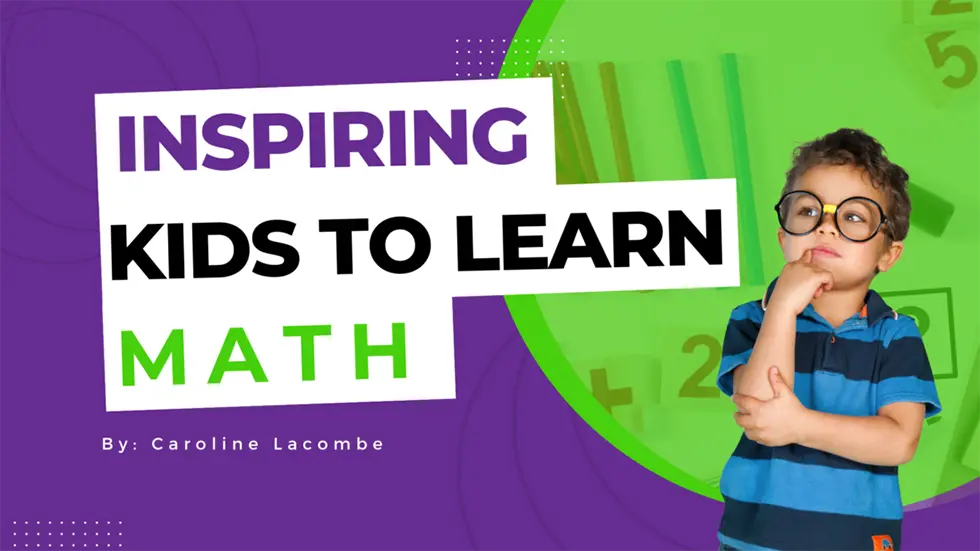By: Caroline Lacombe
Math is often viewed as a daunting, complex subject, which can discourage children from taking an interest in it. There are a few ways you can help ease your child’s anxiety over learning math. The key factor is to make them understand that math is part of everyday life – and can be learned through fun activities! Remember not to talk about your own difficulties with math, since children often mirror adults’ opinions. Having a negative view of the subject from the beginning can hinder a child’s progress. Instead of viewing it a series of complicated numbers and formulas, a more positive view of math. Seeing it as a way to understand the intricacies of the world around us. And who doesn’t like a good mystery to solve?
Learning math at home
Learning mathematical concepts can actually be fun. How, might you ask? For example, you can ask your child to help you bake a cake. Take them to the grocery store with a list of ingredients you’ll need. Have them look for the ingredients and check them off as they find them. They’ll learn how to look for indicators like signs and similar food items to help them find the right aisle. Activities like this will help them see patterns and identify spatial relationships between items, while learning to investigate their environment for clues to solve problems.
Once you are home, have them count out the number of eggs you need for the recipe, and they can measure how much sugar, flour, etc. They will practice learning fractions by measuring things like ¼ cup, or ½ teaspoon. Once the batter is in the pan and ready to go, have them help preheat the oven and time the baking. Then they can see the results of their efforts once it’s done. You’ll have helped them with the concepts of counting, measuring, and timing, all while enjoying a sweet treat at the end!
Games
Games like checkers for young children, or Mastermind for older ones (8+) will help your child practice counting. They will also be keeping score while strategizing their moves in the game. Mastermind is an exciting game for those who love cracking a code. The first player sets up a hidden code at the beginning of the game, which the second player tries to guess by using different sequences of colored pegs.
A game you can play indoors or outdoors is How Many? Ask your child to tell you how many blue shirts, toys, and pairs of socks they have. They can sort them by size or length, for example. While walking in a park, ask them how many dogs they see, or types and colors of flowers.
Math in the great outdoors
Send your kids off on an adventure by giving them a list of objects to collect outside, like branches, rocks, and pinecones. Once they’re back, have them sort the objects by things like shape, color, size, and weight. They can measure the objects with a measuring tape, or by comparing them to other objects and then writing down the measurements. You can then ask them which object is longest, or heaviest. This activity will feel like a treasure hunt for them, and they’ll be excited to show you their findings!
Children love using a stopwatch and can use one to practice the concept of timing. Every cell phone should have a timer app you can use if you don’t have a stopwatch. Have them take turns timing each other doing jumping jacks: how many can you do in 30 seconds? They can practice counting by keeping track of how many times they skip using a jump rope in a minute while someone times them and have them count out loud as they skip.
In Closing
Whether it’s helping measure ingredients while following a recipe or investigating the great outdoors, learning math is something that can be done through everyday activities. With every problem they solve, a child’s confidence will grow as they solve challenges through their own observations, investigations, interactions with others and strategizing. As Galileo said: “Mathematics is the language with which God has written the universe.” There is plenty of wonder and adventure to be had exploring the world around us, and kids can have fun while learning mathematical concepts at the same time.
Other Ways to Connect
We hope you enjoyed these ideas about inspiring your kids to learn math. What are your thoughts on the subject? Please connect with us on Facebook and Instagram and let us know!
If you would like to learn more about upcoming events, sign up to receive our quarterly newsletter here.
Check out some of our other blog posts here, for tips and tricks for single parents, budget hacks, inspiration and more information about what we do here at SPARC Hope.
Inspiring Kids to Learn Math
By: Caroline Lacombe
Author Bio:
Caroline Lacombe has a B.A. in English and Minor in Drama, and currently works at a non-profit that helps seniors live at home as long as possible. She worked for many years at the local newspaper in Lennoxville, Quebec, and writes on various topics, including pets, education and popular culture. Born to an English mother and French-Canadian father, she grew up on the Gaspe coast of Canada, which is home to the majestic Perce Rock.
Her blog can be found at https://carolinelacombeblog.wordpress.com

